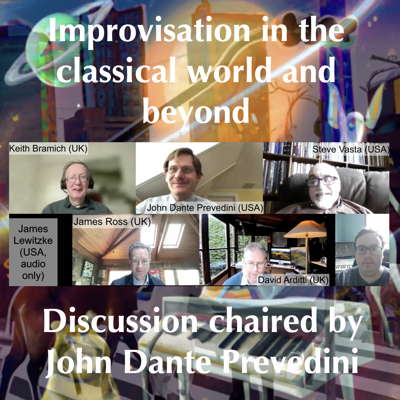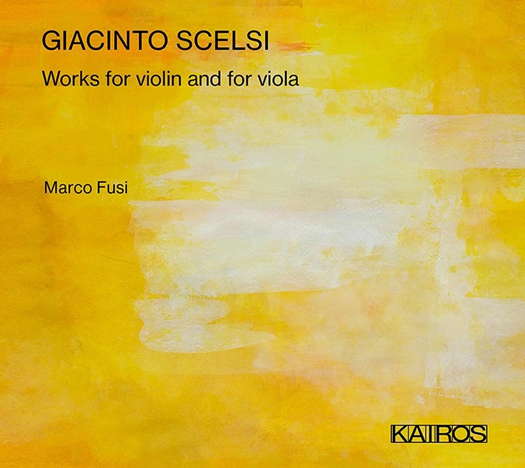- Valery Gergiev
- Mexico
- computer music
- Schuman
- Deutsche Grammophon GmbH
- Ed Lyon
- Zoom
- Cyril Deaconoff: Transformations
 SPONSORED: CD Spotlight. Pure Magic - James Brawn's continued Beethoven Odyssey, awaited by Andrew Schartmann.
SPONSORED: CD Spotlight. Pure Magic - James Brawn's continued Beethoven Odyssey, awaited by Andrew Schartmann.
All sponsored features >>
 DISCUSSION: John Dante Prevedini leads a discussion about Improvisation in the classical world and beyond, including contributions from David Arditti, James Lewitzke, James Ross and Steve Vasta.
DISCUSSION: John Dante Prevedini leads a discussion about Improvisation in the classical world and beyond, including contributions from David Arditti, James Lewitzke, James Ross and Steve Vasta.

On the Border between Innovation and Experimentation
GIUSEPPE PENNISI listens to music by Giacinto Scelsi
'... possessed by sounds, trapped in fingertips that are constantly forced to move.'
I have often reviewed works by Giacinto Scelsi (1905-1988), one the most original composers of the twentieth century: in 2007, the Salzburg Festival dedicated a special section to him and named it Scelsi Kontinent to underline the many areas of music he influenced during his life.
However, Giacinto Scelsi never considered himself a musician. He thought he was a philosopher and a scholar of Asian religions who composed and played music as an amateur for his own personal enjoyment. Of aristocratic descent, Scelsi spent his childhood in his family's castle, in Valva, where he received 'a Middle Age education focused on fencing, checkers games, Latin and Greek'. He developed an early attraction towards piano improvisation. After the Second World War, Scelsi decided to settle in Rome, in a townhouse overlooking the Roman forum; this is now the headquarters of a foundation named after him. His fascination for Eastern philosophies, Yoga and Zen meditation are combined with an insightful knowledge of Christian, Greek, Egyptian and Mesopotamian mythologies. As clearly said in this CD booklet, Scelsi's library and the collection of recordings display his cultural interests, his curiosity and openness to the intricacies of the mind as well as his lifelong quest for a dialogue between different expressions of human spirituality. Scelsi's Roman home was his private hermitage, where he led a reserved life of studies and meditation, seeking contact and communion with superior entities.
In previous reviews of Scelsi's works here, I focused on live performances or CDs where piano and voice were the prominent elements. This CD is a premiere recording of his violin and viola, or rather his ondiola, works, almost always improvisations composed in a state of trance after an intense religious and philosophical meditation, recorded on tape and later transcribed by his assistants for publication by Éditions Salabert in France.
A very interesting feature of this CD is that violinist and viola player Marco Fusi did not work on the transcriptions but on the original tapes available in the archives of the Scelsi Foundation in Rome. Marco Fusi found 'substantial weaknesses' in the transcriptions. Scelsi himself did not devote sufficient time and attention to reviewing his assistants' job: he did not consider himself a musician anyway and he thought that improvising was a very temporary activity that ought to finish at the end of the performance. As a result, the CD has a strong flavour of freshness.
In addition, these compositions are a maze as well as a lace of micro tonalities. Scelsi had constructed a special instrument: the ondiola, rich in microtonal variations, transient attacks, combinations of registers, dynamics and vibrato effects. Marco Fusi imagines a violin or a viola reproducing and transforming these sounds. While discovering the virtuosic possibilities of the ondiola, Fusi developed his own understanding of the instrument. The performance is, thus, brought closer to its original nature, triggering in the mind and body of the performer a state of frantic passivity, possessed by sounds, trapped in fingertips that are constantly forced to move.
This may seem a long introduction to a review of five relatively short works. They were all composed in the mid-1950s and their fast pace of micro variations is very distant from the styles then featured by contemporary concert music. As already said, they were conceived or planned for a concert performance but for an audience of only one – the composer – and possibly not to be repeated again.
The first work is an excellent introduction to microtonalites:
Listen — Scelsi: III (Coelocanth)
(0015063KAI track 3, 2:21-3:19) ℗ 2021 paladino media gmbh :
The second is a set of three studies.
Listen — Scelsi: III (Three Studies pour alto solo)
(0015063KAI track 6, 0:00-0:56) ℗ 2021 paladino media gmbh :
These two compositions are, so to say, in three movements.
The other three are in four short parts. They are three divertissements.
Listen — Scelsi: IV (Divertimento No 4 pour violon solo)
(0015063KAI track 18, 4:07-5:06) ℗ 2021 paladino media gmbh :
In short, this is a very interesting CD on the border between innovation and experimentation.
Copyright © 7 April 2022
Giuseppe Pennisi,
Rome, Italy

CD INFORMATION - GIACINTO SCELSI: WORKS FOR VIOLIN AND FOR VIOLA


